Inconvenient past: crisis communication and World War II
A great number of brands and companies have become aware of the importance of their history, even of the necessity to restore it through a more or less convincing storytelling to their clients and widely to the general public. However, dark and not so dark sides are often overshadowed or minimized in the construction of a unifying and meaningful history of the brand. Indeed…
When examining historical stories or corporate Internet site chronologies, we can notice that the company’s activities during the dark years of World War II are rarely clearly expounded. Company founders actively involved in collaboration, their doubtful political acquaintances or simply their opportunism are often ignored. Most brands, it’s logical, prefer being associated with La Libération and its heroes: thus Louis XIII of Remy Martin evokes Churchill’s craze for the drink, without mentioning the cognac crates delivered in Lauriston street in 1943.

Others were penalized just after La Libération. Thus, Louis Renault charged with collaboration was sent to jail where he died a few months before his company went under public ownership due in particular to “prejudices… caused to the country”. Yet, there regularly arise “cases” that could incite brands to more transparency on the matter. Michel Bar-Zohar, a journalist, unveiled in his work in 1997, that Eugene Schueller – the founder of L’Oréal – had links with La Cagoule and then with Marcel Déat’s collaborationist party.
More recently, Hal Vaughan, an American journalist, asserts in “Sleeping with the enemy, Coco Chanel’s secret war” the famous fashion designer was doing services to Nazis. The Chanel group firmly denies the facts, though admitting “it was not the best period to live a love story with a German”. Besides, when the Galliano affair cropped up, a film showing Christian Dior’s niece praising the virtues of Nazism was dug up.
Reactions differ to these situations tarnishing the brand’s image and reputation. Most of the time, these historical elements and testimonies of an embarrassing past are dealt with from the angle of crisis communication and they are very rarely integrated as such into the corporate communication.
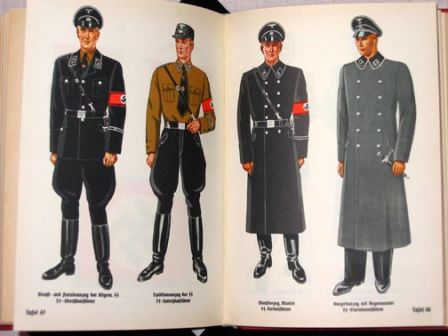
Recently, the Hugo Boss Company had to face this dilemma. In 1997, a Washington Post article revealed its Nazi past: Hugo Ferdinand Boss’s opportunist merging of interests with the Third Reich regime – for which he was sentenced to a heavy fine and to the forfeiture of his civil rights – and his compelling forced labor to make Nazi uniforms. The group then decided to call on a historian, Elisabeth Timm, in charge of studying that past period. So there began a long process. The company resolved to contribute to a compensation fund for forced labor victims without being able for all that to make up their minds to publish the historical study… Hugo Boss broke off with the historian, so long as she expressed herself through the press. Eventually, the work by Roman Koester, a German historian, financed by the company was published in… 2011. A synthesis of this work is available online, whereas the brand clearly asserts its part played in forced labor use on its Internet site.
http://group.hugoboss.com/files/Study_on_the_Companys_History_Abridged_Verson_en_final.pdf http://group.hugoboss.com/en/history_study.html
In France, following the publication of elements revealing Edouard Leclerc’s role during World War II, Michel-Edouard Leclerc has decided to open the family’s and independent distributors group’s archives to a historian from La Sorbonne. The research conclusions will be presented on a collaborative Internet site, where Net surfers having documents related to the company’s history will be able to enrich the contents.
History does not only harm a brand, it can also strike a direct blow to its profits, as with the SNCF, which, because of their role in the Shoah, could see the American market close its doors in their face. Indeed the company admitted, as soon as 1995, its part in the deportation of thousands of Jews – referring to the President of the Republic’s speech during the Vel’d’Hiv’ commemorations: “As the arm of the French State, the SNCF company takes up these words and the sorrow they reflect of the victims, the survivors and their families who suffered because of our part during the war”. Indeed the SNCF opened its archives in 2000 and signed a partnership with the Shoah Memorial. Yet these gestures remain insufficient for American victims associations and some elected representatives. However, the SNCF spares no efforts and displays a real “historical” communication plan. In January 2011, Guillaume Pepy, its president, asserted that the SNCF was a “cog in the machine of the Nazi extermination” while underlying they had been requisitioned and compelled to do so by the occupying forces. The French company finances educational programs in California and Florida taking open responsibility for its part and claiming it is willing to improve public access to its archives. Its American Internet site devotes a large coverage to World War II and commits itself to an approach of openness.
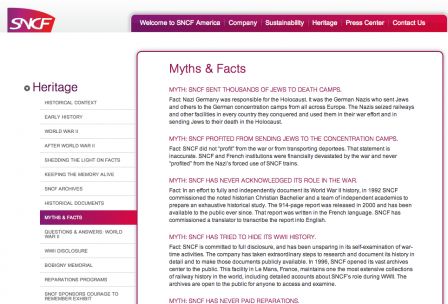
Considered opportunistic, this process hardly convinces Americans. In March 2011, members of Congress brought in a bill, which never passed, whose purpose was to start legal proceedings against the SNCF for its part during World War II. In May 2011, the governor of Maryland signed a law forcing railroad companies in the run for State contracts to reveal their contribution in the deportation of Jews.
Therefore, the present strategy of many brands and companies ignoring their history seems dangerous. The part played by many of them during World War II is regularly brought to light. If some feel compelled to assume their past, their reputation is never unharmed. And the confrontation with its history or its “public”, witnessing a flaw in the brand storytelling can be violent.
http://www.sncfhighspeedrail.com/heritage/myths-facts/
http://www.rue89.com/2011/10/04/deportation-la-sncf-a-lheure-du-grand-pardon-aux-etats-unis-224853



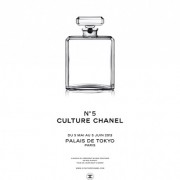

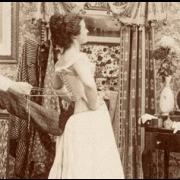
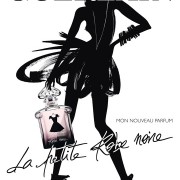
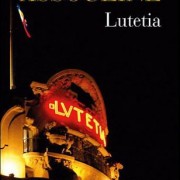


Leave a Reply
Want to join the discussion?Feel free to contribute!